When planning a trip to Germany, two cities often come to mind: Berlin vs Munich.
These two metropolises, both rich in history and culture, offer unique experiences for travelers.
Berlin, the capital, is known for its vibrant arts and nightlife scene, while Munich, the heart of Bavaria, showcases traditional German architecture and world-renowned events like Oktoberfest.
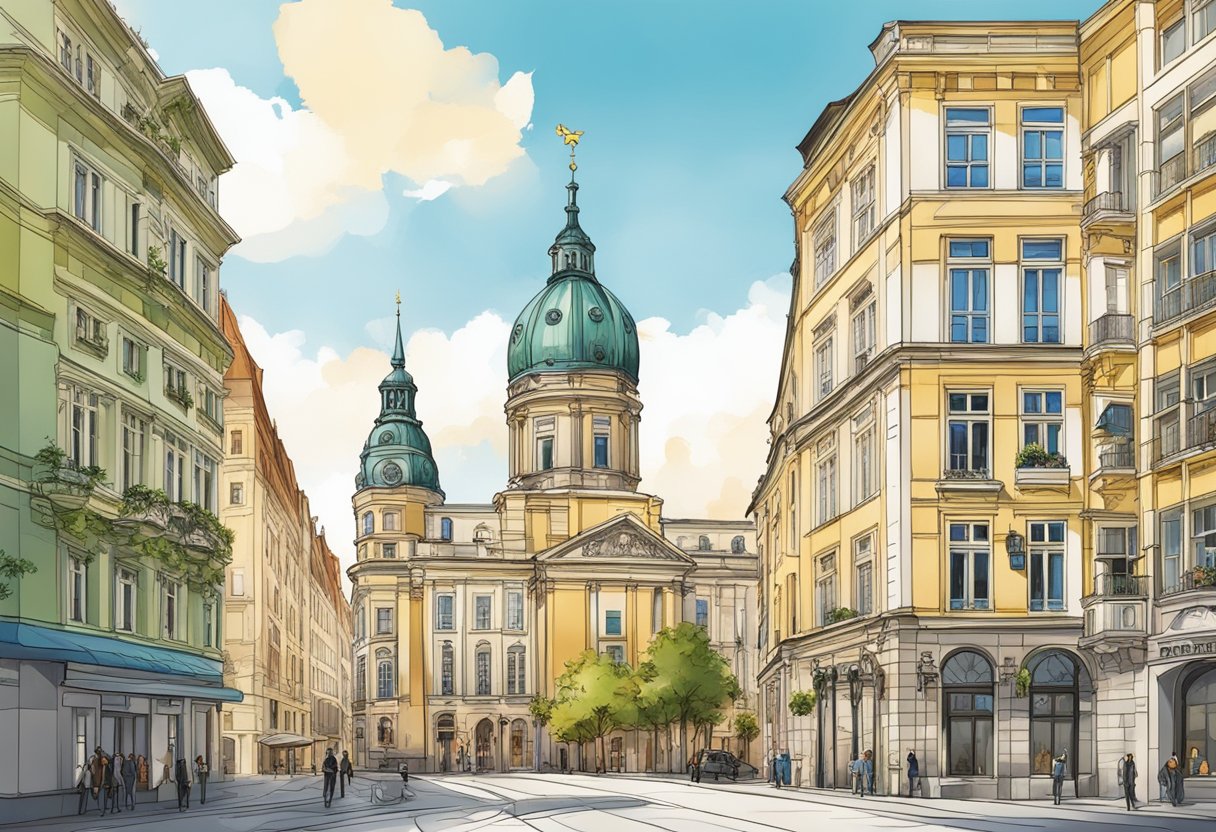

In comparing Berlin and Munich, it’s essential for travelers to consider both their interests and preferences.
Each city has distinct qualities, celebrating the diversity and richness of German history and culture in different ways.
By examining the cities’ historical backgrounds, cultures, lifestyles, tourist attractions, and festivities, travelers can make an informed decision about which city to visit or prioritize.
Key Takeaways
- Berlin and Munich offer unique and contrasting experiences for travelers exploring Germany.
- When comparing the two cities, consider factors such as history, culture, lifestyle, and attractions.
- Deciding which city to visit depends on individual preferences and interests.
Berlin Vs Munich: An Overview
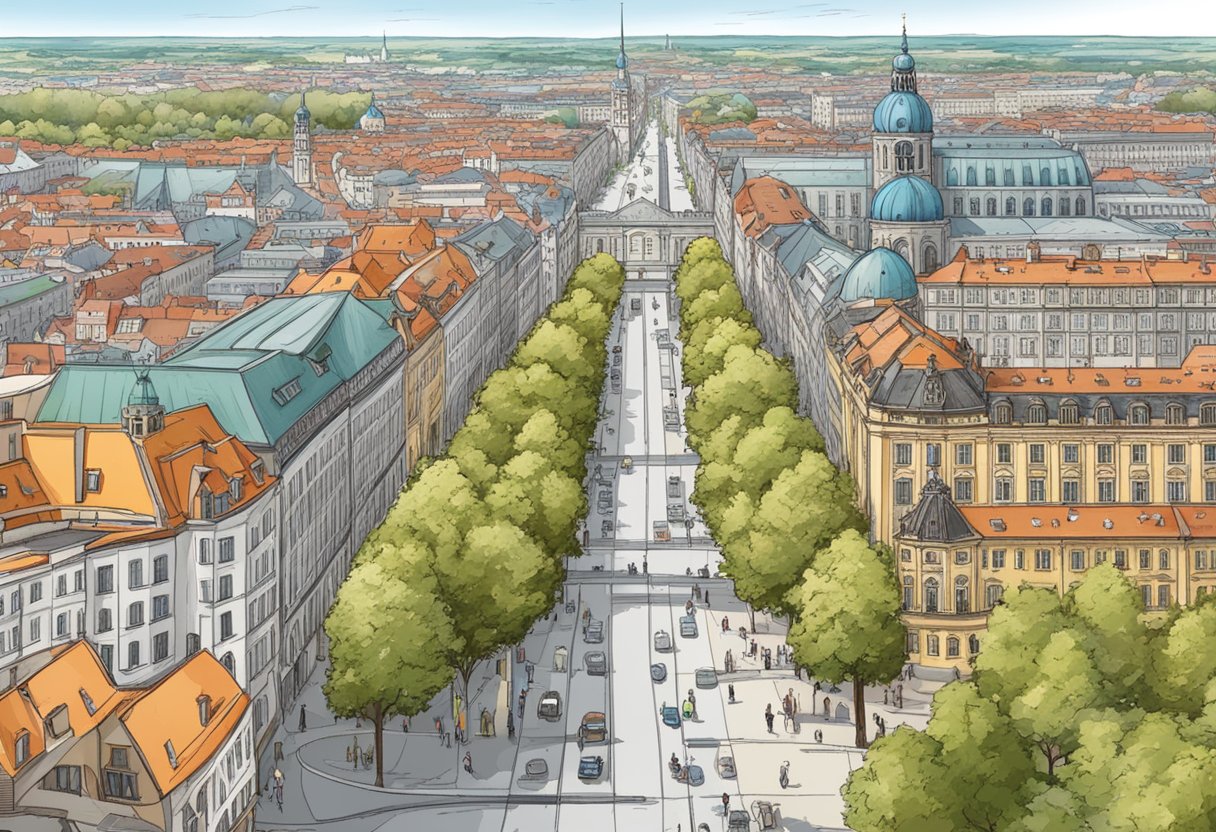

When planning a trip to Germany, you might wonder which city to visit – Berlin or Munich. Both cities are metropolises with their own charms and attractions.
Berlin, the capital city of Germany, is known for its rich history, vibrant arts scene, and diverse neighborhoods.
You’ll find remnants of the Berlin Wall, iconic landmarks like the Brandenburg Gate, and an array of interesting museums.
The nightlife in Berlin is legendary, offering a mix of trendy bars, clubs, and cafes.
On the other hand, Munich is the capital of Bavaria, a region in the south of Germany, and offers a more traditional German experience. Famous for its world-renowned Oktoberfest celebrations, Munich is a city surrounded by stunning mountains and forests.
You can enjoy a variety of historic castles, breweries, and museums galore.
While Berlin might be the city for history buffs, creatives, and night owls, Munich is ideal for those who appreciate nature, tradition, and a more laid-back atmosphere.
Munich is generally considered a more expensive city than Berlin due to its high living costs1.
However, both cities have excellent public transportation systems, making it easy to explore their attractions.
In summary, Berlin and Munich are two distinct German cities, each offering a unique experience. Consider your interests and priorities when choosing which city to visit.
Footnotes
Historical Background
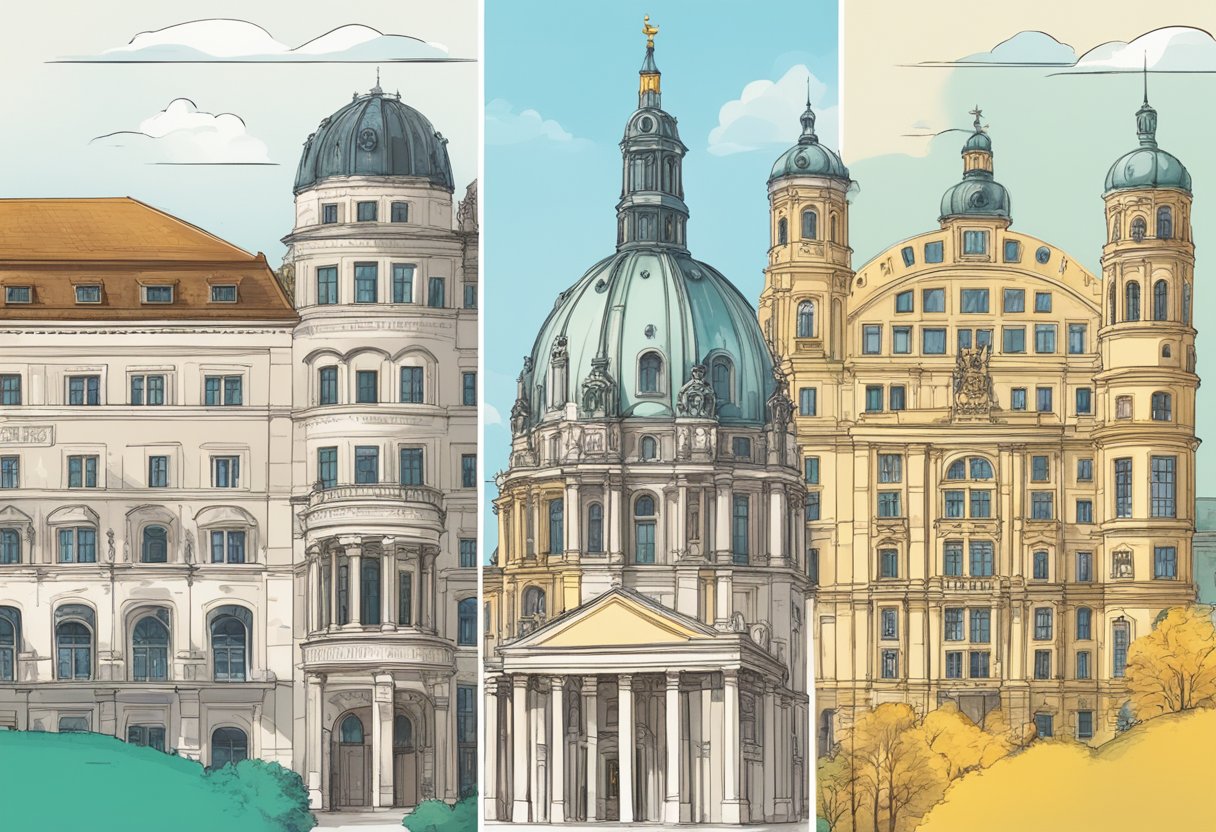

World War II Impact on Berlin vs Munich
When visiting Berlin, you can’t ignore the impact of World War II on the city.
From the ruins of the Reichstag to the remnants of the Berlin Wall, the city is a living testament to the past.
The destruction caused by the bombing and extensive fighting left a lasting mark on Berlin, giving it its unique, eclectic, and chaotic appearance.
In Munich, the impact of World War II is still visible, but the city has maintained a more traditional Bavarian look and feel.
As one of the most affluent regions in Germany, Munich was able to rebuild and preserve much of its history, maintaining a deep sense of Bavarian culture.
This is something you’ll experience as you explore the historic castles, breweries, and museums sprinkled throughout the city.
While both cities experienced hardships during and after World War II, their unique histories and modern day atmospheres provide contrasting experiences for visitors.
In Berlin, you’re exposed to a diverse mix of cultures and history, with remnants of the Berlin Wall and the scars left by war.
In Munich, you’ll find a more classic German experience, with historic sites and a strong dedication to traditional Bavarian customs.
By understanding their historical backgrounds, you can appreciate the distinct nature of both cities and make the most of your visit.
Comparing Cultures in Berlin vs Munich
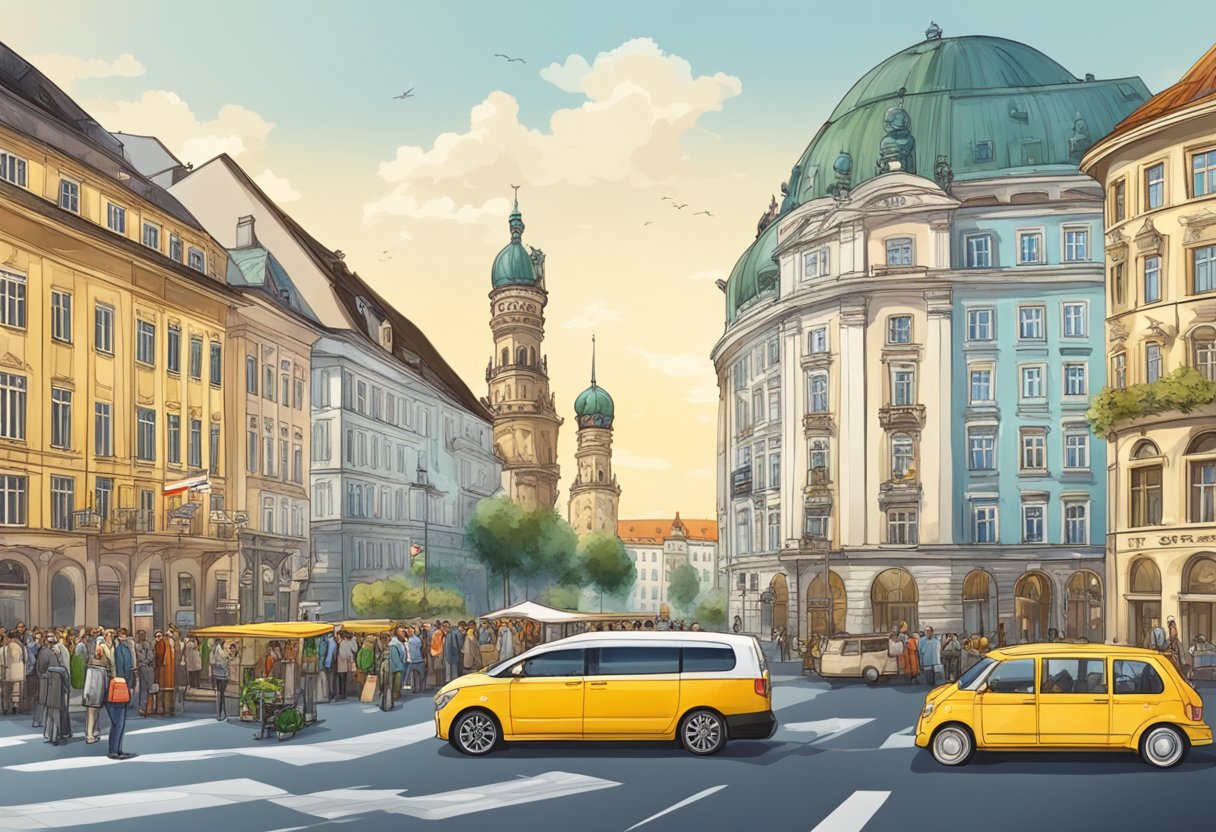

Traditional Vs Modern
Berlin and Munich offer vastly different cultural experiences.
While Munich maintains a strong connection to its Bavarian heritage, giving you a taste of tradition and history, Berlin is a hub for modern art and cutting-edge subcultures.
The LGBTQ community, in particular, thrives in Berlin, highlighting its progressive values.
Artistic Perspectives
Berlin is well-known for its dynamic art scene, brimming with museums, galleries, and vibrant street art.
The city is home to many artists and creative minds who push the boundaries of contemporary art. In contrast, Munich boasts a blend of traditional and contemporary art in its many museums and galleries, reflecting the evolution of German culture.
Culinary Delights
Munich offers an authentic taste of traditional German food and Bavarian cuisine, including bratwurst, pretzels, and Schnitzel, in numerous local restaurants.
From Haute cuisine to cozy beer gardens, Munich ensures an unforgettable gastronomic experience.
Meanwhile, Berlin caters to diverse palates with its multicultural street food, experimental cuisine, and trendy eateries.
Both cities provide a unique culinary adventure, whether you prefer traditional dishes or more modern flavors.
Lifestyle and Living
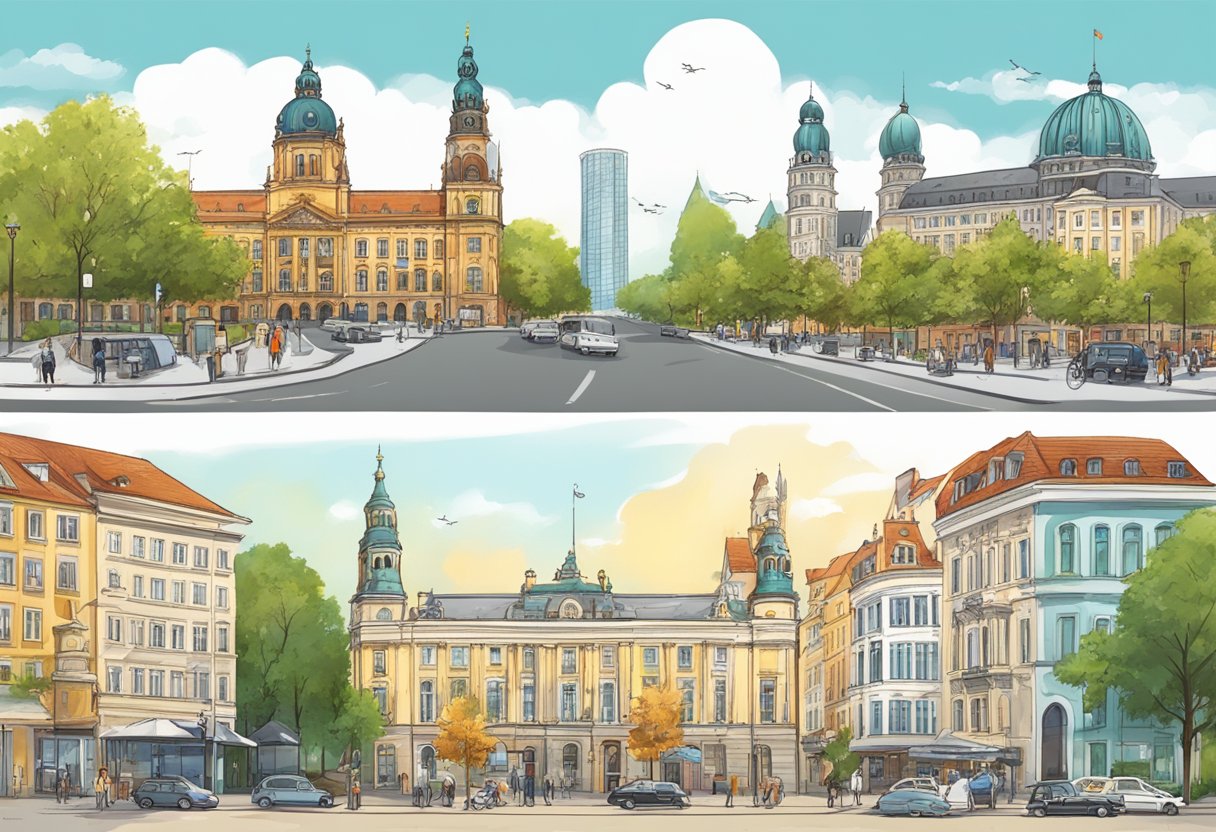

Housing and Cost of Living
When comparing the cost of living in Berlin and Munich, you’ll find that Munich is generally more expensive. Rent prices in Munich are 9.5% higher compared to Berlin.
Expenses for groceries and restaurant prices in Munich are 2.6% and 13.9% higher than in Berlin respectively.
Keep in mind that Munich is the most affluent region in Germany, so the higher cost of living reflects the increased quality of life.
On the other hand, Berlin is known for being more affordable, with a lower cost of living and a wider range of accommodation options.
Safety and Unemployment
As for safety, both cities are safe, but Munich has an edge due to its more stable economy.
Munich’s unemployment rate is typically lower than Berlin’s, and the city’s higher standards of living generally contribute to a more secure living environment.
In Berlin, the cityscape is more diverse, with a vibrant mix of cultures and expats.
While this makes Berlin exciting to live in, it also means that the unemployment rates can be higher than in Munich.
Public Transportation
Public transportation systems are efficient in both cities.
Munich boasts an extensive network of buses, trams, and trains, including the Munich Central Station, which serves as a major hub for regional and international train connections.
In Berlin, you’ll have access to a similarly efficient public transportation system.
The city has buses, trams, and trains that make it easy to travel throughout the city and beyond.
The Berlin Hauptbahnhof (Central Station) is also known for its impressive architecture and function as a major European transportation hub.
Remember, in both cities, public transportation is affordable and reliable, ensuring that getting around is convenient for residents and visitors alike.
Fun and Festivities
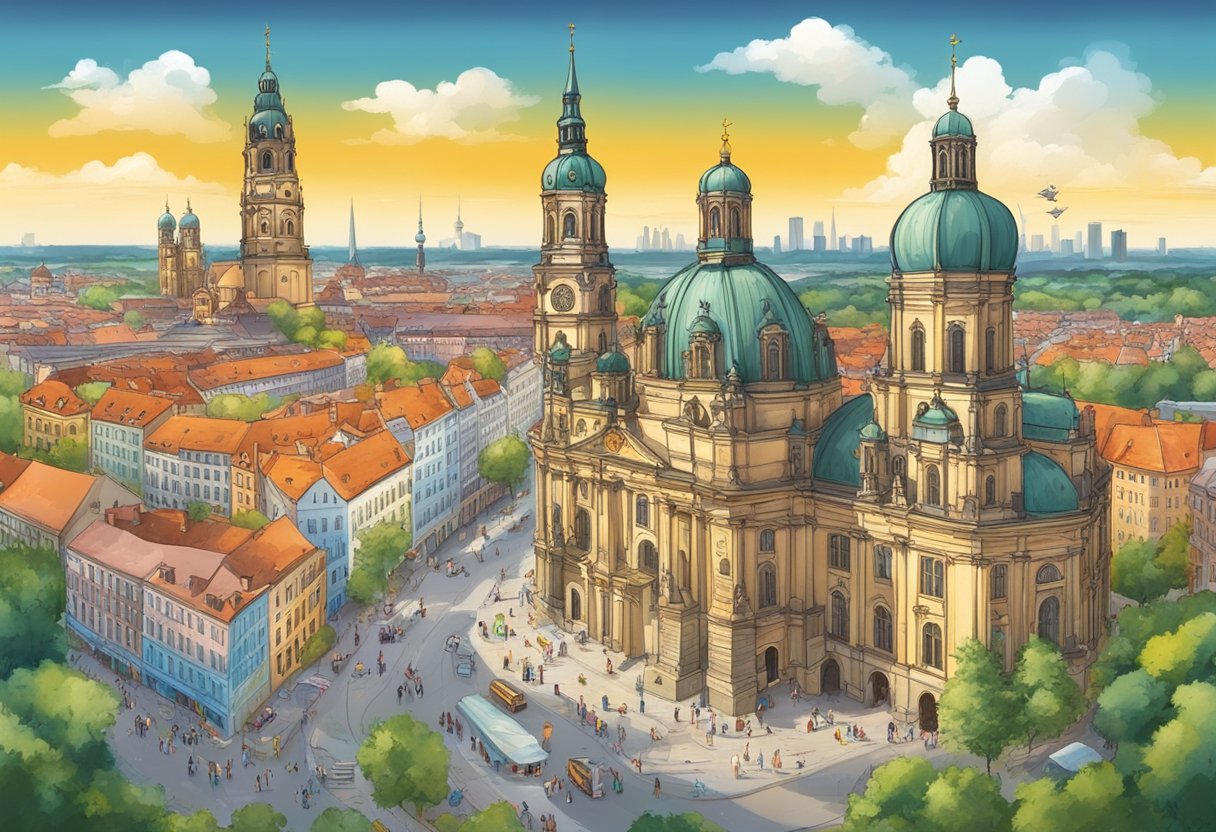

Nightlife and Entertainment in Berlin vs Munich
Berlin boasts an active nightlife with a vast array of clubs, bars, and theaters.
The city is home to some of the most famous techno clubs like Berghain, attracting party-goers from around the globe.
You’ll never be bored with the variety of nightlife options, ranging from casual bars to upscale establishments.
There’s something for everyone.
In Munich, you’ll find a slightly more laid-back vibe when it comes to nightlife.
However, this doesn’t mean there’s a lack of entertainment.
The chic bars, craft beer pubs, and traditional beer gardens provide a perfect setting to unwind and enjoy time with friends.
The city also has an attractive theater and live music scene worth exploring.
Festivals and Events
When it comes to festivals, both cities have unique events to offer.
Berlin hosts a variety of celebrations throughout the year, such as the International Film Festival, the Carnival of Cultures, and the famed Berlin Art Week.
These events cater to diverse interests, making Berlin an exciting destination for cultural enthusiasts.
Munich is proud to showcase its most famous music and beer festival, Oktoberfest.
This iconic event draws millions of visitors annually, offering traditional Bavarian food, beer, and entertainment.
Munich also appeals to your romantic side with lovely Christmas markets and picturesque castles nearby.
To sum up, you’ll be able to experience a myriad of festivities and entertainment options in both Berlin and Munich, catering to different tastes and preferences.
Tourist Attractions in Berlin vs Munich
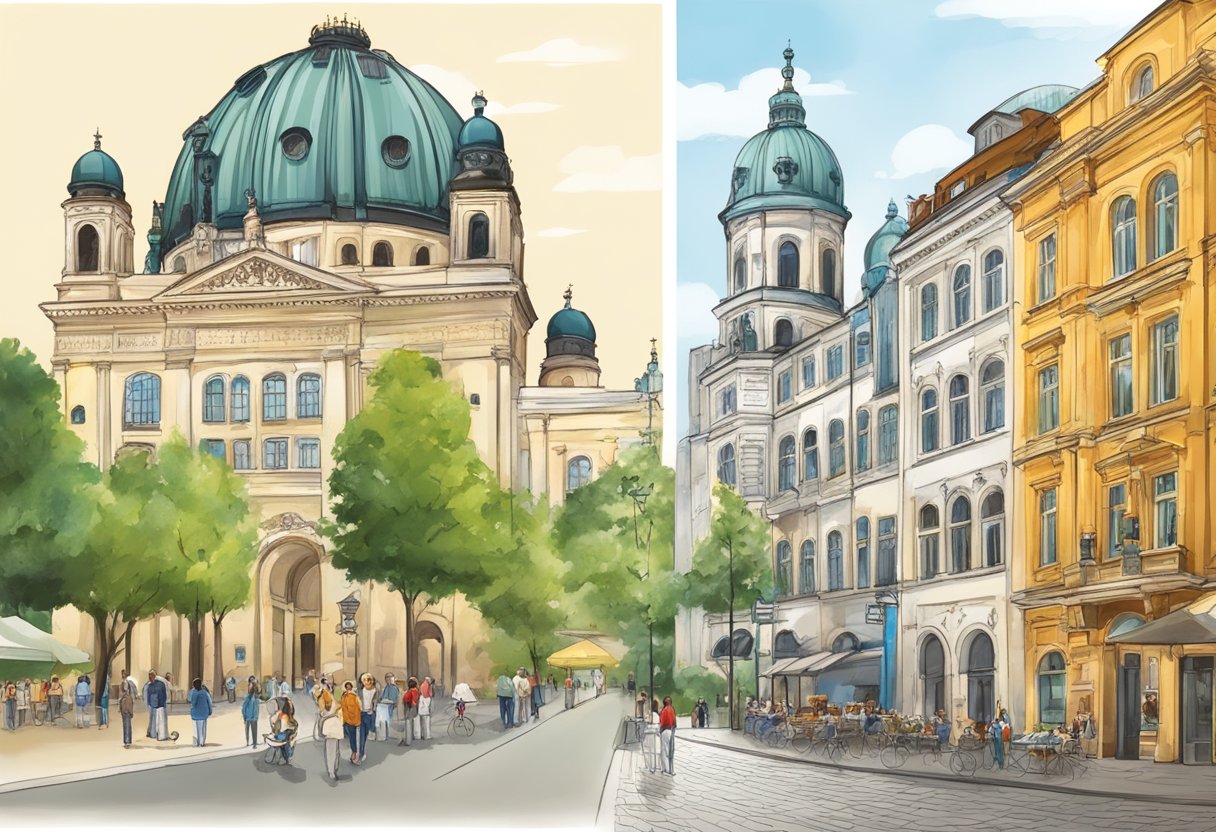

Historical Landmarks
In Berlin, you’ll find numerous historical landmarks that showcase the city’s rich history such as the iconic Brandenburg Gate, the Reichstag building, and the remnants of the Berlin Wall.
Don’t forget to visit Checkpoint Charlie as well.
On the other hand, Munich is home to the stunning Neuschwanstein Castle and historic sites like Marienplatz and the Old Town.
Parks and Recreation
Berlin offers lush parks like Tiergarten and Tempelhofer Feld while Munich boasts the beautiful Englischer Garten, one of the largest urban parks in the world.
Both cities have ample green spaces for you to relax and enjoy nature.
Shopping and Cityscapes
For shopping enthusiasts, Berlin has districts like Kurfürstendamm and Friedrichstraße with a mix of high-end boutiques and local shops. Munich’s Marienplatz and Old Town provide a more traditional shopping experience.
In terms of cityscapes, Berlin is known for its modern skyscrapers and cutting-edge architecture.
Munich, however, retains its classic charm with historic buildings like the Alte Pinakothek and the Pinakothek der Moderne.
Visiting Berlin Vs Munich
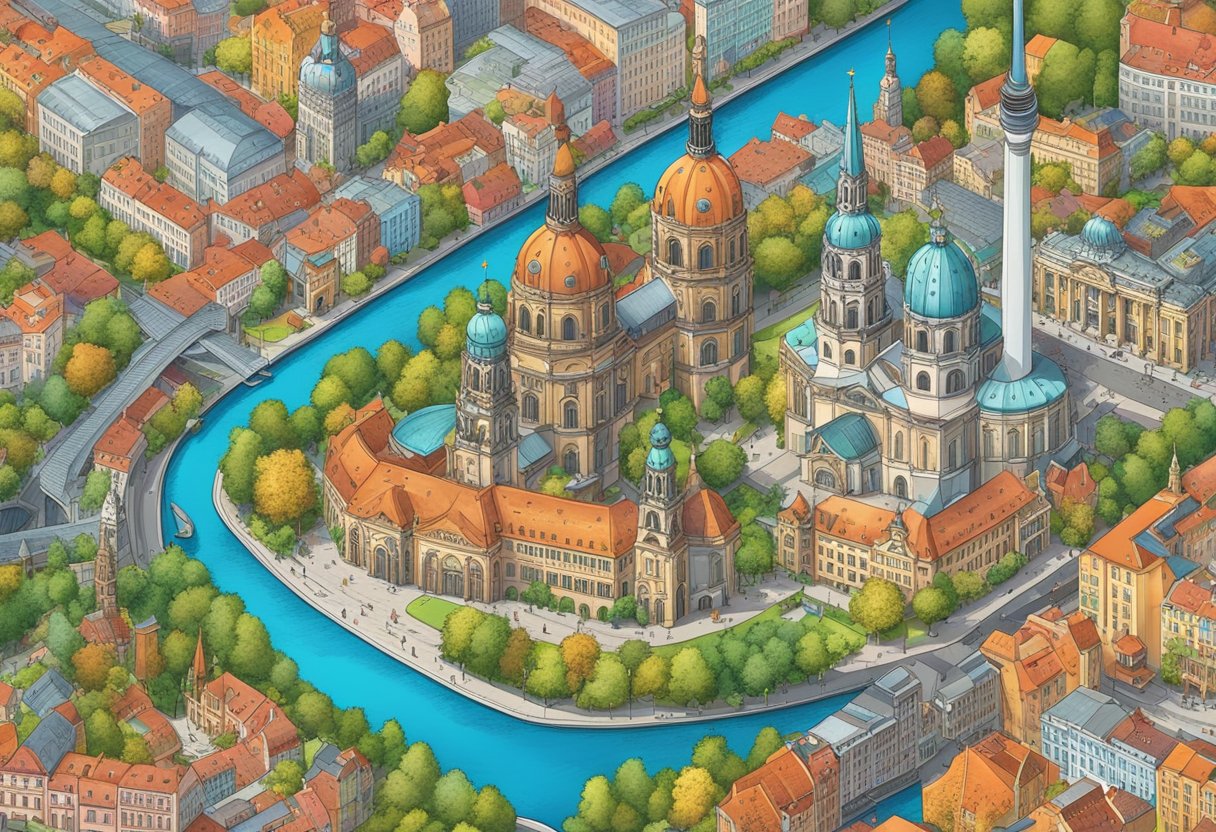

Where to Stay
In Berlin, you have a wide range of accommodation options, including hotels, hostels, and vacation rentals.
It is recommended to stay in popular neighborhoods such as Mitte, Kreuzberg, or Prenzlauer Berg, where you’ll find plenty of attractions, restaurants, and nightlife.
Mitte is the most central district and allows easy access to the city’s main sights, while Kreuzberg is known for its vibrant art scene, and Prenzlauer Berg offers a blend of history, green spaces, and shopping.
In Munich, you can also choose from hotels, hostels, and vacation rentals, with popular areas to stay, including Altstadt, Maxvorstadt, and Schwabing.
Altstadt is the historic city center, making it an ideal location for sightseeing.
Maxvorstadt is home to many museums and universities, creating a lively atmosphere, whereas Schwabing is famous for its bohemian vibe and beautiful parks.
| Berlin Neighborhoods | Munich Neighborhoods |
|---|---|
| Mitte | Altstadt |
| Kreuzberg | Maxvorstadt |
| Prenzlauer Berg | Schwabing |
Best Time to Visit
The best time to visit Berlin or Munich largely depends on your personal preferences and interests.
In terms of temperature, both cities experience similar climate patterns, with pleasant springs (April-May), warm summers (June-August), and mildly cold autumns (September-October). Winter (November-March) is the coldest, with temperatures often dropping below freezing and occasional snowfall.
If you prefer milder weather, spring and autumn are ideal.
For those interested in attending popular events, the notable Oktoberfest takes place in Munich from late September to early October, attracting millions of visitors from around the world.
Berlin hosts the Berlinale, a major film festival, in February, as well as the Festival of Lights in October.
Keep in mind that during these events, accommodations tend to book up quickly and prices may be higher.
| Event | City | Date |
|---|---|---|
| Oktoberfest | Munich | Late September-Early October |
| Berlinale | Berlin | February |
| Festival of Lights | Berlin | October |
In summary, both Berlin and Munich offer a range of attractions and experiences for travelers.
While Berlin is famous for its cultural and artistic scene, Munich gears more towards traditional Bavarian charm and history.
Ultimately, the choice depends on your tastes and preferences; whatever you decide, you’re guaranteed to enjoy these unique German cities.
Conclusion
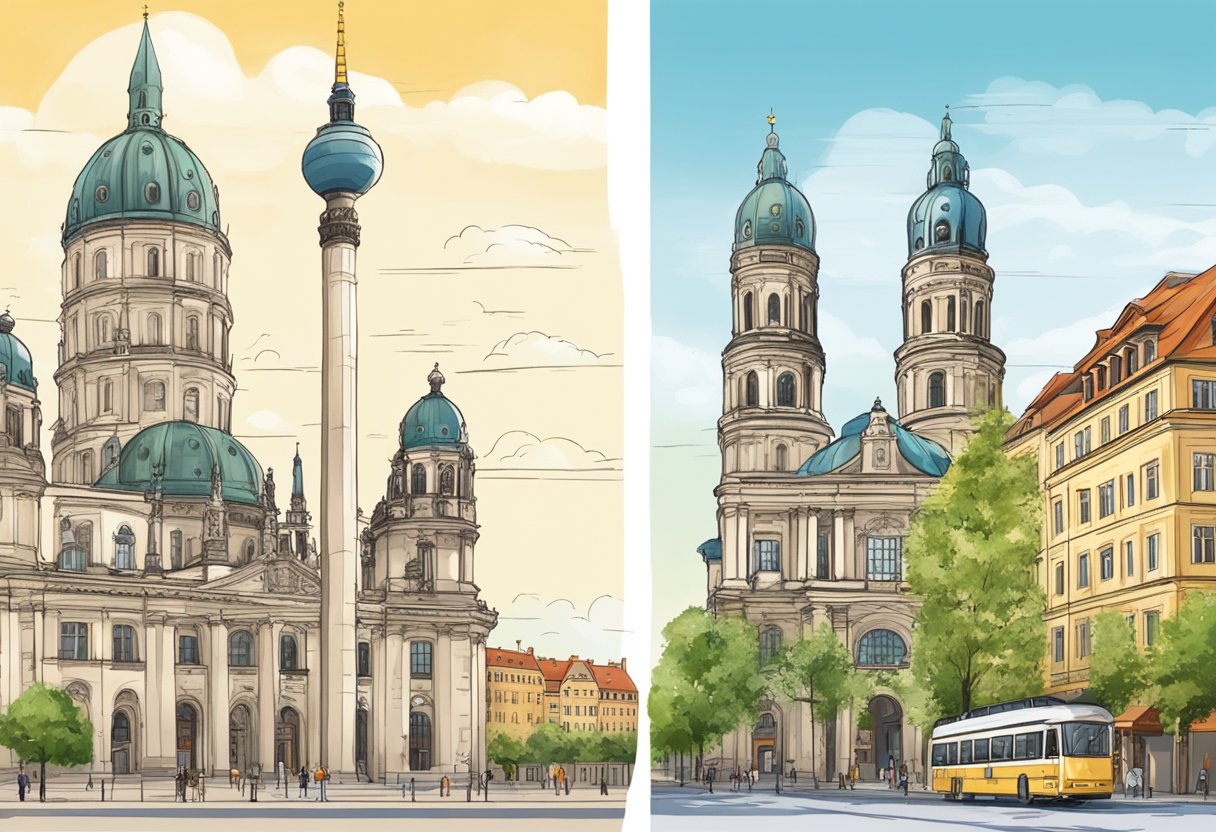

In the debate of Berlin vs Munich, both cities have their unique offerings. Berlin, the capital of Germany and the largest city in the European Union, is known for its vibrant and diverse culture.
Munich, on the other hand, offers visitors a deep sense of Bavarian traditions and a higher standard of living.
When it comes to nightlife, Berlin takes the crown as the city that never sleeps, with a wide range of clubs and bars.
Munich, while having a lively scene, is more laid-back and leans towards traditional beer gardens and pubs.
In terms of cost, Berlin is a more affordable option compared to Munich. You can find hostels at lower prices in Berlin and overall expenses are generally lower.
Munich, being a more expensive city, makes it a consideration when determining which city to visit.
Both cities have well-developed public transportation systems that are rather affordable.
Exploring the cities via public transportation will not pose a significant difference in terms of cost.
Ultimately, the decision on whether to visit Berlin or Munich depends on your personal preferences, interests, and budget.
If you’re drawn towards history, alternative culture, and art, Berlin is your destination.
However, if you favor tradition, architecture, and a more upscale atmosphere, Munich is the place to be.
Remember, you can always plan to visit both cities and have the best of both worlds.
Frequently Asked Questions
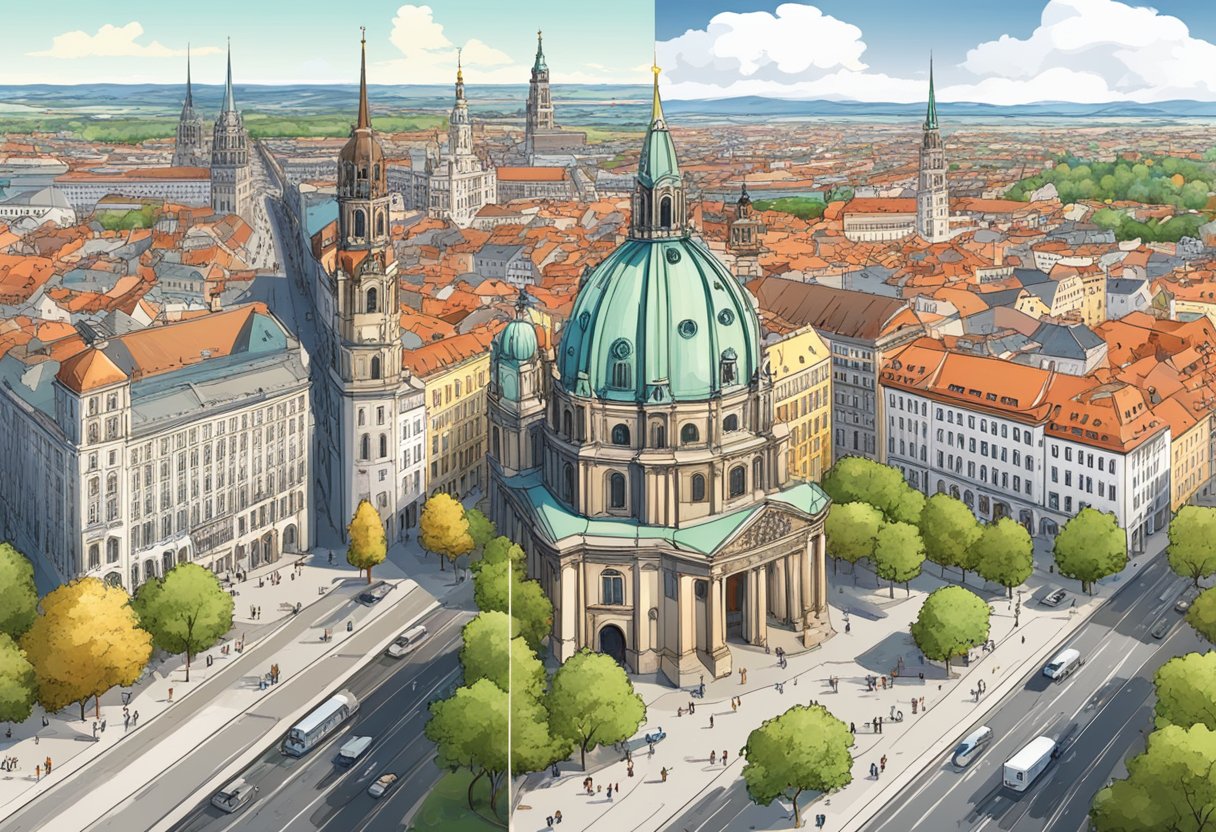

Which city is better to visit, Munich or Berlin?
It depends on your preferences. Munich is known for its traditional Bavarian culture, cleanliness, and more affluent atmosphere. Berlin, on the other hand, is a diverse, vibrant city offering a mix of cultures and a trendy atmosphere. Both cities have their unique charms, so base your decision on the experience you are seeking.
How do Munich and Berlin compare in terms of nightlife?
Berlin is well-known for its vibrant nightlife, with a large variety of clubs and bars, catering to all tastes. Munich also has a lively nightlife scene, but it’s more focused on traditional beer gardens and pubs.
Are Berlin and Munich more expensive?
Munich is generally considered to be more expensive than Berlin. Meals and accommodation in Munich tend to be pricier than in Berlin. However, both cities are relatively affordable compared to other European capitals.
Which city has better weather, Berlin or Munich?
Munich experiences milder winters and slightly warmer summers than Berlin. Berlin, situated in the northeast part of Germany, has colder winters with occasional snowfall. Munich enjoys mild summers with pleasant temperatures. Your preference will depend on the type of weather you enjoy.
What is the best option for Christmas, Munich or Berlin?
Both cities celebrate Christmas in their unique ways. Munich is famous for its charming Christmas markets offering traditional crafts and festive treats. Berlin also has Christmas markets but with a more international flair. Consider the ambiance and activities you prefer before choosing the city for your Christmas getaway.
How do transportation options from Berlin to Munich compare?
There are several options for traveling between Berlin and Munich. You could take a train, which takes around 4 hours, or fly, which takes roughly an hour in transit. Buses and car rentals are also available. Ultimately, the choice of transport depends on your priorities regarding time, cost, and convenience.

